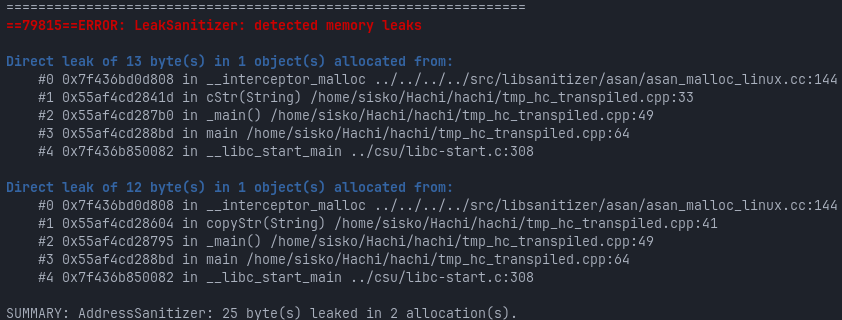Use Hachi
Make sure clang++ and make are installed.
git clone https://gitlab.com/hachi-lang/hachi
cd hachi
makeThere is now an install script accessible. To install, just run:
curl -fsSL https://hdev.run/install | bash
That’s it. It’s suggested that your Hachi executable be placed in your PATH somewhere. Additionally, set HACHI_LIB to the lib directory. There are plans in the future to manage this more efficiently by way of running install scripts. When importing modules, Hachi will look in the HACHI_LIB first, and if the module doesn’t exist there then imports become relative paths.
$ hachi -h
╔════════════════════════════════════╗
║ ⠀⠀⠀⠀⠀⠀⠀⠀⠀⠀⠀⠀⠀⠀⠀⠀⠀⠀⠀⢀⡴⣄⠀⠀⠀⠀⠀⣀⣤⠀⠀⠀ ║
║ ⠀⠀⠀⠀⠀⠀⠀⠀⠀⠀⠀⠀⠀⠀⠀⠀⠀⠀⠀⡸⠁⠌⣆⠀⠀⠀⣴⡟⠊⡇⠀⠀ ║
║ ⠀⠀⠀⠀⠀⠀⠀⠀⠀⠀⠀⠀⠀⠀⠀⠀⠀⠀⢐⡇⠁⠄⣸⡿⣿⡛⢿⣕⠀⡆⠀⠀ ║
║ ⠀⠀⠀⠀⠀⠀⠀⠀⠀⠀⠀⠀⠀⠀⠀⠀⠀⠀⣸⣇⣼⣾⣻⠝⠉⠓⠀⠏⠙⠅⠀⠀ ║
║ ⠀⢀⠔⢒⠒⠀⠀⠀⠀⠀⠀⠀⠀⠀⠀⠀⠀⢰⣿⣻⠷⠛⠁⠨⣯⠂⠀⠸⠓⡇⠀⠀ ║
║ ⣰⠉⢀⡎⠀⠀⠀⠀⠀⠀⠀⠀⠀⠀⠀⠀⠀⣿⣿⡇⠀⠀⠀⢀⡀⠀⠀⠀⢠⣾⣷⠄ ║
║ ⡟⢠⣿⣧⠀⠀⠀⠀⠀⠀⠀⠀⠀⠀⠀⠀⢰⣿⣿⣷⠀⠀⠀⠀⠘⢆⣤⣀⣀⡽⠍⠀ ║
║ ⢡⠨⣟⣾⣶⣄⣀⢀⣀⣀⣤⣤⣤⣤⣤⣶⣿⣿⣿⣯⣷⡀⠀⠀⠨⠐⠨⢴⠞⠁⠀⠀ ║
║ ⠈⠢⣈⣻⡾⢿⣿⢿⣟⣿⣻⣽⣻⣽⢯⣟⣷⣟⣾⣳⣧⠑⠀⠀⠀⠀⠀⢸⠀⠀⠀⠀ ║
║ ⠀⠀⠀⠉⢩⣿⢯⣿⣞⣯⡷⣿⣽⢾⣟⡿⣾⡽⣾⣻⡙⡇⠀⠀⠀⠀⠀⢑⠃⠀⠀⠀ ║
║ ⠀⠀⠀⠀⣾⣟⣯⣷⣻⣽⣿⣳⣯⢿⣞⣿⣳⡿⣯⣷⠇⠀⠀⠀⠀⠀⡰⠏⠀⠀⠀⠀ ║
║ ⠀⠀⠀⠀⣿⣯⣟⣾⡽⡻⠤⠄⣊⠉⠙⠚⠙⣿⣳⡿⠀⡐⠀⡀⣄⢔⡇⠀⠀⠀⠀⠀ ║
║ ⠀⠀⠀⡠⠿⠷⠏⣋⠜⡇⠀⠀⢠⠏⠒⠒⣦⠉⠉⠀⢠⠥⡔⠈⠅⢸⠀⠀⠀⠀⠀⠀ ║
║ ⠀⠀⡜⠀⢀⡴⠊⠁⣜⠁⢀⡔⠁⠀⠀⠀⠸⡀⠀⠀⡸⠀⡃⠁⠀⡞⠀⠀⠀⠀⠀⠀ ║
║ ⠀⠀⡇⠀⡜⠀⠀⠀⠘⡄⠈⣇⡀⠀⠀⠀⠀⡇⠀⠀⡇⠀⢹⠀⠀⣧⠀⠀⠀⠀⠀⠀ ║
║ ⠀⢰⠁⢂⠱⢆⠀⠀⠀⠑⢀⣑⣘⡧⠀⠀⠀⢹⠀⠀⢇⠀⠐⢆⠀⠸⠤⢄⠀⠀⠀⠀ ║
║ ⠀⠀⠉⠘⠂⠉⠀⠀⠀⠀⠀⠀⠀⠀⠀⠀⠀⠀⣇⠈⢉⢉⡄⠈⠂⠤⠤⠭⠃⠀⠀⠀ ║
║ ⠀⠀⠀⠀⠀⠀⠀⠀⠀⠀⠀⠀⠀⠀⠀⠀⠀⠀⠉⠉⠉⠁⠀⠀⠀⠀⠀⠀⠀⠀⠀ ║
║ 🌟🌌 WELCOME TO HACHI! 🌌🌟 ║
╚════════════════════════════════════╝
🔥 Hachi v0.2.2 – Code like a legend! 🔥
👑 Author: Mike Curnow
🚀 Usage : hachi [⚙ options] [📄 source.hachi] [⚙ options]
✨ OPTIONS ✨
-v, --version Show Hachi version and exit
-h, --help Show this help screen
-d, --debug Enter debug mode before execution
-i, --init 🔧 Bootstrap a new Hachi project here
-cpp <file> ↗️ Emit transpiled C++ to <file>
-b, --build <file> ⚙️ Compile Hachi into a binary
-buildml <file> 🐞 Leak-detector build (memory insights)
-go ▶️ Build & run on the fly
-cf <flags> 🛠️ Pass custom flags to your C++ compiler
-target <triple> 🎯 Cross-compile target (arch triple)
[cpp] -cc <flags> 📦 Hachi-driven C++ build commands
-c <code> 📝 Run inline Hachi snippet & exit
💡 Pro Tip: Mix & match flags to suit your workflow. Stay Legendary! 💡After installing Hachi, you probably gonna want to run this puppy. So to start off, you can simply run hachi -h to see all commands you can run. Here we’ll cover general commands to use.
Compile
-build
This builds the executable from a defined Hachi file.
Syntax:
hachi <filename>.8 -build <program-name>Example:
# Build "skate"
hachi sk.8 -build skate
# Run "skate"
./skate-buildml
This builds the executable from a defined hachi file and checks for memory leaks.
This is intended mainly to use on hachi code which makes use of the outerCPP and innerCPP commands since any raw C++ code you may choose to embed can introduce unsafe contexts which are outside the coverage of hachi’s own memory safety mechanisms. Essentially C++ code used in either of the aforementioned commands is not included in hachi’s auto-free mechanism as it’s an unsafe advanced mechanism, and the -buildml flag allows the you to see where you may have introduced unsafe code that you may choose to correct.
NOTE:
Hachi’s own print statements can be flagged under this mechanism if you’re printing literals. Best practice is just to use the shout function.
Another memory safety item to disclose here is that hachi dynamically assigns memory to objects. Currently running with -buildml flag will still flag areas where memory is being dynamically allocated. Hence it’s recommended use is only for when you’re code includes raw C++ code.
Syntax:
hachi <filename>.8 -buildml <filename>Example:
hachi sk.8 -buildml skateScreenshot:

Cross-Compilation
Hachi now supports cross-compilation between various architectures by specifying a target triple after the -target flag.
Syntax:
hachi <filename>.8 -build <program-name> -target <target-triple>Example:
hachi sk.8 -build skate -target aarch64-unknown-linux-gnuMore Commands
-cpp
Translates Hachi file to a C++ file.
Syntax:
hachi <filename>.8 -cpp <filename>.cppExample:
hachi sk.8 -cpp skate.cppLinux tested, other OS’s will be soon.
-d/-debug
Runs Hachi command with a visual debug output including AST and AT.
Syntax:
hachi <filename>.hachi -d <other-commands>Example:
hachi print.hachi -d ╭─────────────╮
┏━━━━━┥ print.hachi ┝━━━━━┓
┃ ╰─────────────╯ ┃
┃ 1 one: 1 ┃
┃ 2 print: one.String ┃
┃ 3 # Test comment ┃
┃ ┃
┗━━━━━━━━━━━━━━━━━━━━━━━━━┛
╭──────────────────────╮
│ abstract syntax tree │
╰──────────────────────╯
┏━┴━━━━━━━━━━━━━━━━━━━┓
┠────╮ ┃
┃ ╭──┴──╮ ┃
┃ │ one ├╮ ┃
┃ ╰─────╯│ ┃
┃ ╭─┴─╮ ┃
┃ │ 1 │ ┃
┃ ╰───╯ ┃
┠─────╮ ┃
┃ ╭───┴───╮ ┃
┃ │ print ├────╮ ┃
┃ ╰───────╯ │ ┃
┃ ╭───┴────╮ ┃
┃ ╭┤ String │ ┃
┃ │╰────────╯ ┃
┃ ╭──┴──╮ ┃
┃ │ one │ ┃
┃ ╰─────╯ ┃
┗━━━━━━━━━━━━━━━━━━━━━┛
╭─────────────╮
│ action tree │
╰─────────────╯
┏━┴━━━━━━━━━━━━━━━━━━━━━━┓
┠──────╮ ┃
┃ ╭────┴────╮ ┃
┃ │ set one ├─╮ ┃
┃ ╰─────────╯Int ┃
┃ ╭─┴─╮ ┃
┃ │ 1 │ ┃
┃ ╰───╯ ┃
┠─────╮ ┃
┃ ╭───┴───╮ ┃
┃ │ print ├───────╮ ┃
┃ ╰───────╯ String ┃
┃ ╭───┴────╮ ┃
┃ ╭─┤ String │ ┃
┃ Int╰────────╯ ┃
┃ ╭────┴────╮ ┃
┃ │ get one │ ┃
┃ ╰─────────╯ ┃
┗━━━━━━━━━━━━━━━━━━━━━━━━┛
...
-cf
Compile Flags. Allows you to specify C++ compiler flags in your build.
Syntax:
hachi <filename>.8 -cf <flags> -build <program-name>Example:
hachi coolProgram.8 -cf "-std=c++17 -ldl" -build coolProgram-cc
Compile C/C++ files as build tool. Allows you to specify C/C++ files and compiler flags in your build.
Syntax:
hachi <filename>.cpp -cc "<compiler-flags> <program-name"Example:
hachi yoloSwag.cpp -cc "-std=c++17 -ldl -o yoloSwag"-c
Inline code execution support for Hachi code, similar to python’s -c command. You can run one-liner code straight from the hachi command.
Syntax:
hachi -c <code>Example:
hachi -c ">@ \"fmt/fmt\" shout: \"Hachi is awesome!\""Run
Hachi files can be ran instead of compiled, similar to how Go’s go run command works. In short, it compiles the Hachi file and executes it.
-g/-go
This is a one-liner Hachi command compiles and executes the program. When used with arguments, be sure to offset args by 3 in your code.
Syntax:
hachi <filename>.8 -go <arguments>Example:
hachi cliArgs.8 -go These Are ArgumentsScreenshot:
